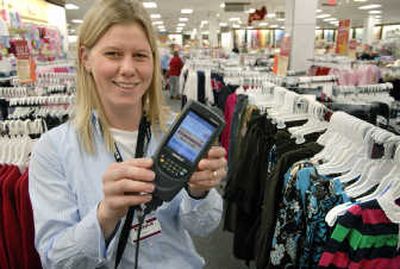Double-check those sales tags

It could pay for post-holiday shoppers hitting clearance sales to check their receipts, a recent state survey indicates.
About 3 percent of 11,000 items rung up at retailers statewide cost more or less than their posted prices during random checks, according to the Washington state Department of Agriculture. That means consumers could have paid from 10 cents to $74.80 extra on products, the November survey showed.
While employees of the department’s Weights and Measures Program make scanner checks throughout the year, they “do an emphasis during and before the holiday shopping season,” said Kirk Robinson, program manager.
“It’s a good time to do that because the stores are making a lot of price changes,” and officials want to ensure they’re also changing shelf prices, a common source of errors, Robinson said.
State law mandates shelf and scanner prices align. If retailers fail three inspections, the program could fine them as much as $10,000, Robinson said.
About 15 percent of 145 stores targeted statewide failed, meaning more than 2 percent of products sampled at each was overcharged, according to the program. Stores with lots of small items, such as auto- and office-supply outlets, generally showed more mistakes, Robinson said.
In Eastern Washington, 2 percent of 3,000 items scanned failed, while 18 percent of 42 stores failed – numbers similar to last year’s results, he said. Schuck’s Auto Supply in Colville failed after it overcharged for four items, said Crystal Tulip, store manager. Products placed in the wrong spot by employees or customers were the biggest problem, she said.
Workers at the store, which Tulip estimated carries about 16,000 items, will focus on combing those sections, doing random price checks and double-checking signage to prevent future errors, she said.
Officials will conduct follow-up checks early next year, Robinson said.
Kohl’s is looking at alternative methods to help consumers, such as automatically updated, electronic price displays in the store’s shoe section, said Kirstie Best, who manages the NorthTown Mall location. Kohl’s, which was not part of the state survey, also offers scanners around the store for customer use, she said.
“When you look at the amount of the different types of merchandise in any given store … it’s a challenge for any retailer to make sure it’s correct,” she said.
Spokane resident Shanna Hale, 30, and her mother, Linda DeLong, hit the Spokane Valley Mall as part of a decades-old day-after-Christmas tradition. They found some items cheaper than posted, said DeLong, 59.
“I think you definitely have to watch” for incorrect charges, Hale said, adding clerks may be focusing on moving people along quickly.
“We’re pretty savvy shoppers,” DeLong said.
But for Idahoan Dave Watson, 49, the possibility of overcharging “really doesn’t cross my mind.”
“I don’t think they’re stealing from you,” he said.
The Weights and Measures Program has 12 inspectors statewide, and four in Eastern Washington – only enough to do random checks, Robinson said. It doesn’t target Spokane stores, because the city has its own department.
Spokane Weights and Measures representatives could not be reached for comment Wednesday.
In Idaho, checks are handled on a complaint-only basis, said Tom Schafer, section manager for the Idaho State Department of Agriculture’s Bureau of Weights and Measures.